Greece: the center of an ancient civilisation, home to a sprawling city rife with ruins, and blessed with 6,000 islands scattered across two seas. It’s a popular destination, rich in landscape, turquoise seas, and white sand beaches alongside charming mountain villages, coastal towns, and hermetic monasteries. Here’s why, when you visit Greece, you need to see more than just the islands.
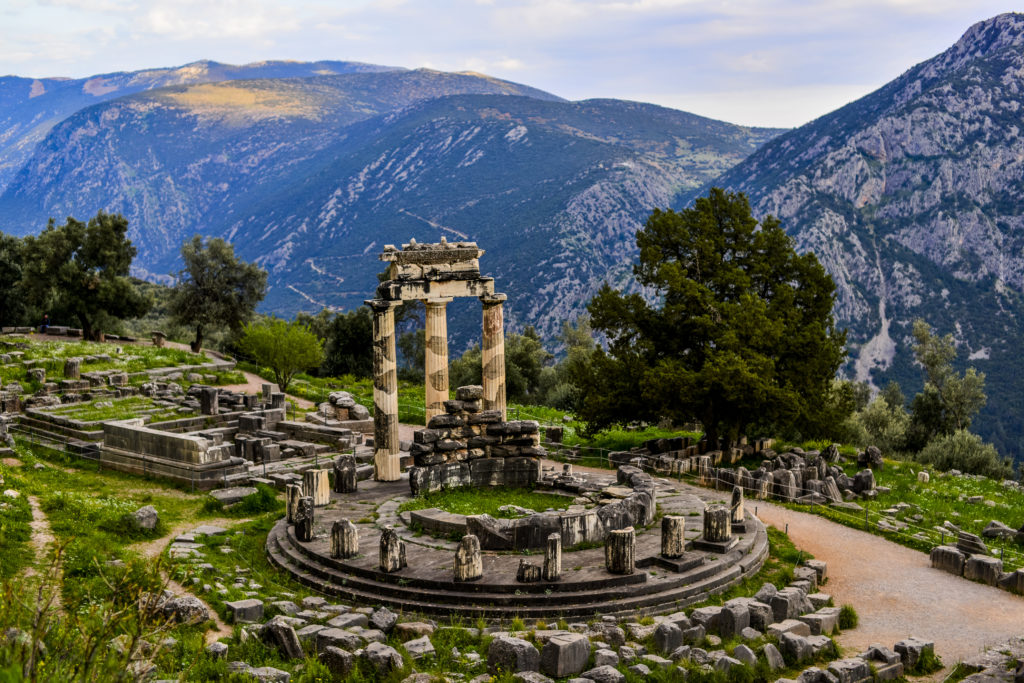
Delphi lies in the rugged mountains, and is well known for its Oracle, who spoke for the god Apollo.
Greece: a destination worth visiting and revisiting
Many people think of just the islands when they visit Greece. They fly to Athens and immediately catch a flight or ferry to Mykonos or Santorini. But there is so much more to this fascinating epicentre of human history.
The Greek Mainland
Athens, of course, grabs our attention with the glimmering Acropolis towering over Plaka, the oldest part of the city. Because the Greek Empire spanned so much of the Balkan region, many of the heritage sites are within the northern park of Greece. Of the 18 UNESCO World Heritage Sites in Greece, 12 are on the mainland, from Athens to Bassae, Olympia, and Mycenae in the west to Thessaloniki, Philippi, and Meteora in the north.
Founded in 315 BCE, Thessaloniki was the second largest and most important city in the Byzantine Empire. Devastated by fire in 1917, the modern city has a distinct European feel and is among the best mid-sized cities for future capital and human lifestyle. It is popular among street photographers for its diverse streets.

The monasteries at Meteora are mysterious and desolate, yet no less intriguing or captivating.
The Greek Islands
Of the 6,000 islands scattered among the Adriatic and Ionian Seas, only 227 are inhabited. Not surprisingly, this means that no matter kind of vibe a traveler searches for, they’ll find it on one of the islands. Greece is a wonderful destination for solo travelers, honeymooners and couples, families with young and old kids, multigenerational families, and groups of friends. (So there’s no excuse to not visit Greece!)
A typical itinerary combines the siren call of the islands with the heritage and culture of Athens. Travelers who have been to Greece before may wish to include Thessaloniki or another city to broaden their scope of Greece.
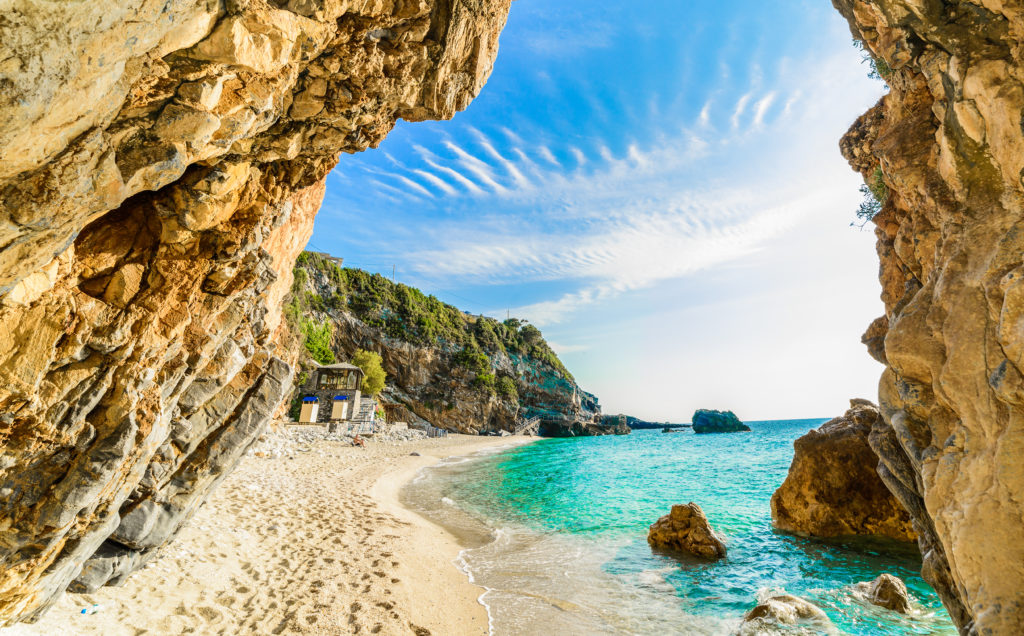
Greece’s 6,000 islands include sea caves, crystal clear waters, sandy beaches, rocky shores, and more.
How to Get to Greece
The majority of travelers arrive in Greece at Athens International Airport Eleftherios Venizelos (ATH). Emirates operates a year-round flight from Newark; it is the only year-round nonstop from the US. Delta Air Lines operates a seasonal New York (JFK) to Athens flight, while United operates seasonally out of Newark and American operates seasonally out of Philadelphia. Beginning in May 2019, American will offer a seasonal Chicago to Athens nonstop flight.
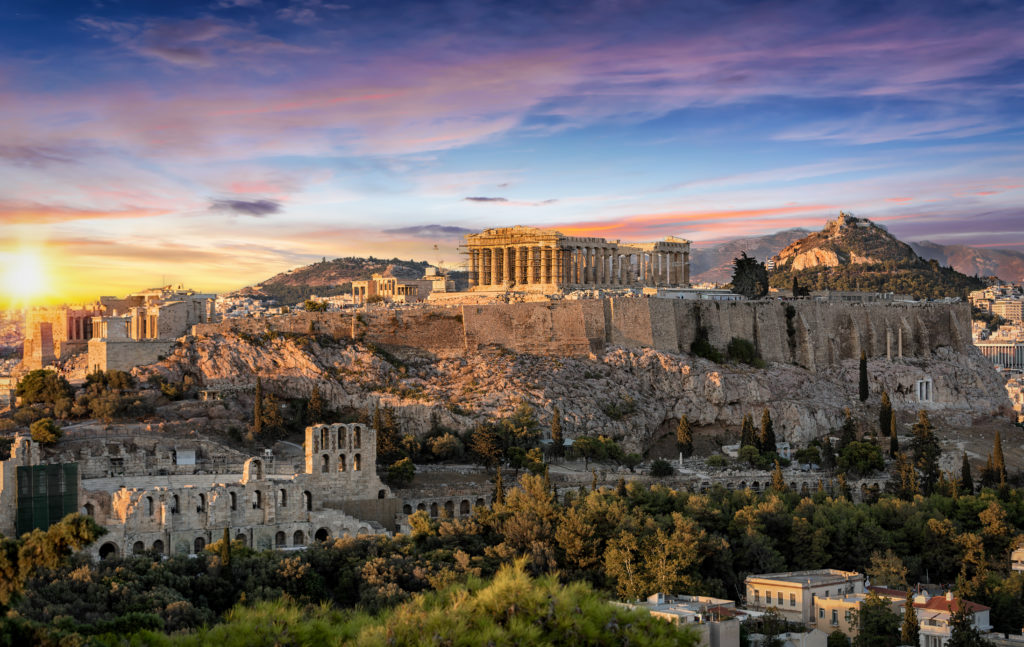
The Acropolis, seat of power of the Hellenic Empire, rises hundreds of feet above Athens.
You can also get to Athens from numerous gateways across Europe.
There are airports across many of the islands. Both Santorini and Mykonos have airports, as does Crete (Heraklion International Airport is the second busiest airport in Greece), Corfu, Rhodes, and more. Note that the majority of these flights connect in Athens, and its often more expensive to fly back to the mainland. Overall though, it is very easy to visit Greece!
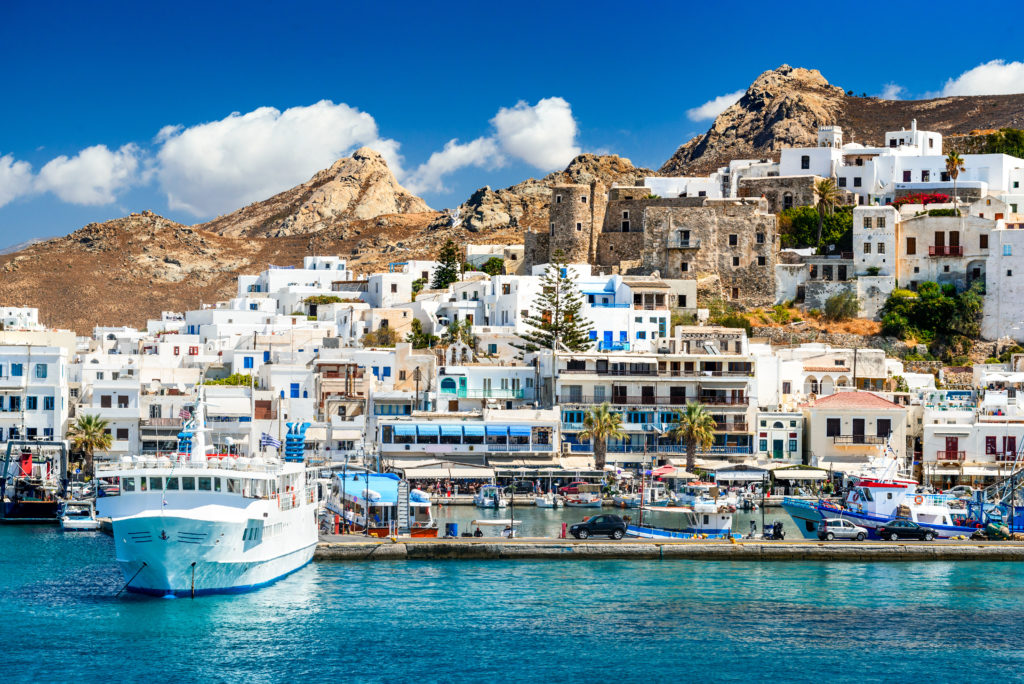
Ferries are the best way to get around to the many Greek islands.
How to Visit Greece
To get between Athens and the islands, either fly or take a ferry. The port city of Piraeus is connected to Athens via the train system. It’s very easy to take ferries around the islands, although not all routes operate year-round. Not surprisingly, the summer months see the highest frequency of ferries. You may also find that getting between islands means going back to Piraeus; a travel advisor can assist in designing the best route to see the islands.
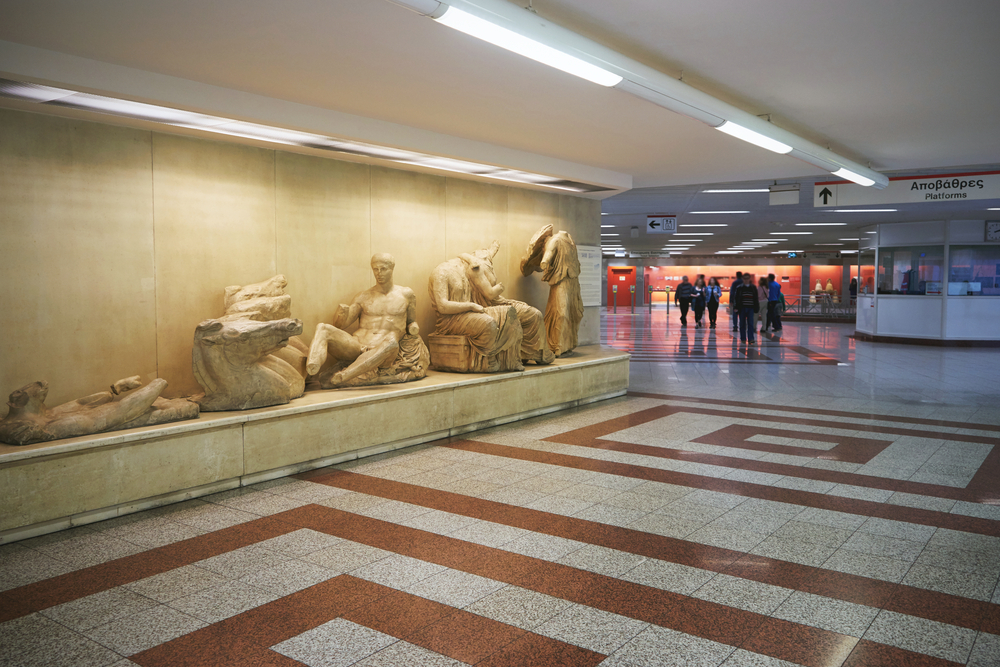
Artifacts found during construction of the Athens Metro can be seen in the metro itself. sianstock / Shutterstock.com
In Athens, the best way to get around is by metro, which began operations in 1869 as a conventional steam train and is now a very modern rapid transit underground. Due to the unique structure of Athens as an ancient city with a number of layers and archaeological ruins everywhere, the metro acts as an open air museum. Don’t miss this unique experience when you visit Greece!
To get from Athens to some of the other mainland cities, like Corinth, Delphi, and so forth, the best way to get around is by car. If you aren’t comfortable renting a car, a hired driver/guide makes for a great alternative.

Meteora’s monasteries often get skipped for the lure of the sunny islands, but should definitely be on an itinerary of northern Greece.
What to do in Greece
There’s plenty to see and do in Greece, from marveling at ancient ruins to tasting olive oil and ouzo. Once again, I’ve broken this down into sections based on interests, so you can read them all or skip to the parts that interest you!
Arts and Culture
The Mycenaean culture, which is wide acknowledged to be the first of the Greek civilizations, dates from 1900-1100BCE. In the late Bronze Age, poleis (cities) began to form, while what we consider Classical, or Hellenic Greece dates from 600-500BCE. After this, history begins to shift into the Roman eras. From the Mycenaeans to the Classical Greeks, we have extraordinary paintings, sculptures, mosaics, and frescoes. Many can be seen in the museums in Athens, or in archaeological reconstructions of important sites like Knossos.
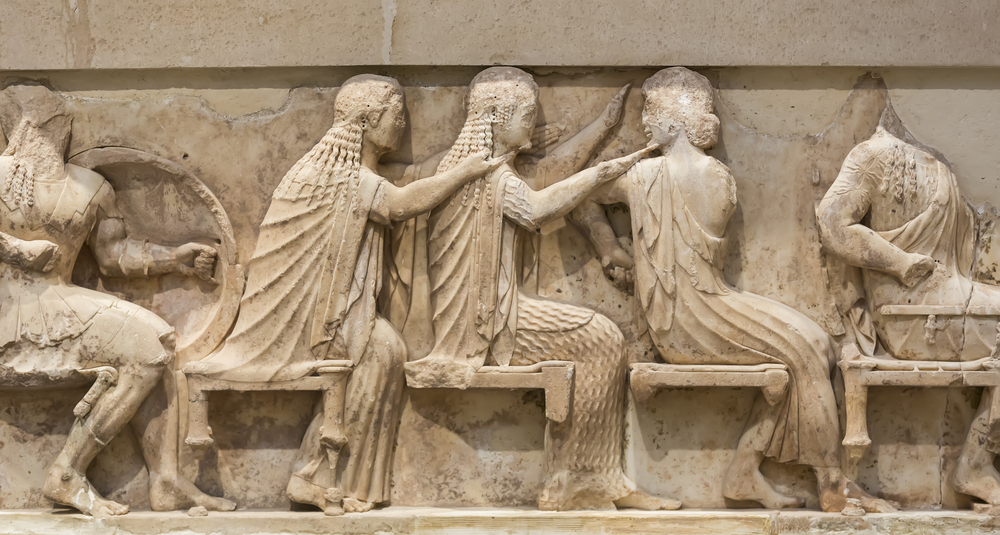
Greek sculpture can be found on temple friezes, painted urns, and more.
Greek literature remains important today, with works by Aesop, Pindar, Virgil, Homer, and Sappho still read. We continue to cite notable works by Socrates, Aristotle, and Plato, among others. Thucydides and Herodotus are credited with transforming the study of history and philosophy into something worth pursuing.
History
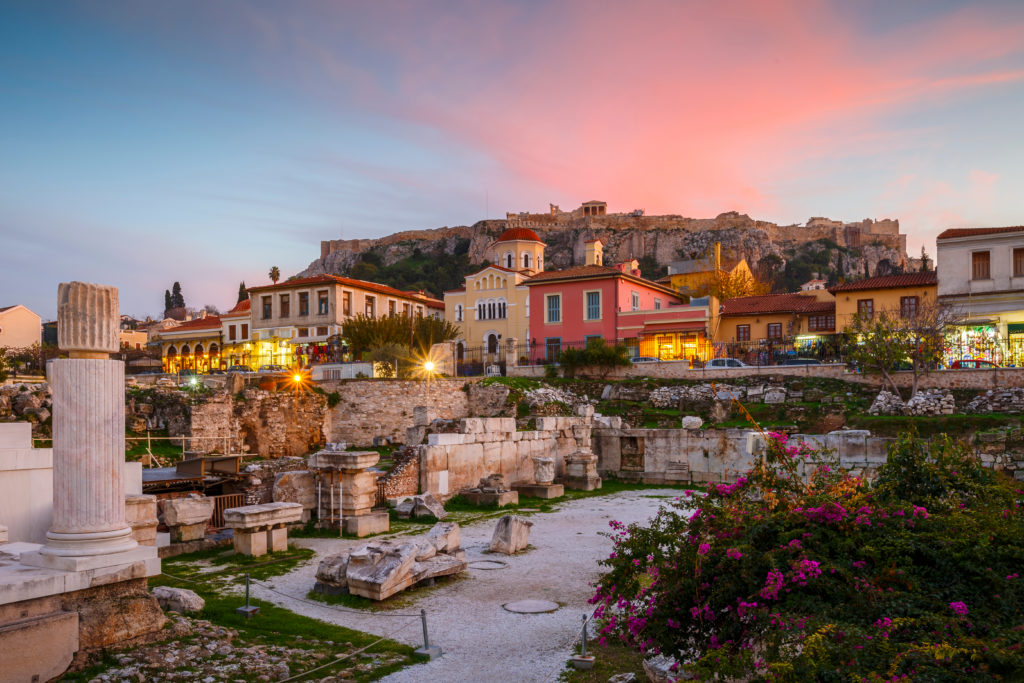
Plaka, the oldest neighborhood in Athens, is rife with ruins.
Greece has thousands of historical sites, from the world famous Parthenon in Athens to the awe-inspiring theatre at Epidaurus and the Acropolis of Lindos, on Rhodes. There are so many that it would take you lifetimes to see them all.
In Athens alone, the Archaeological Museum houses artifacts from sites across Greece, and is one of the largest museums in the world. The Acropolis Museum, at the foot of the ancient temple complex, houses artifacts from the Acropolis alone. Both are vast collections and incredibly rewarding to visit. Located in the family’s former mansion, the Benaki Museum gives “a captivating overview of Greek history throughout the ages.”

Greek food, like gyros, has been influenced by many of the surrounding cultures.
Food and Wine (and Ouzo)
Ancient Greek cuisine utilised the Mediterranean trifecta: wheat, olive oil, and wine. Although today’s cuisine is far more advanced, the staples remain. A traditional Greek meal involves fish, some meat, a grain, seasonally appropriate vegetables, and olive oil. Like many other cultures that relied on locally sourced foods, Greek food shifted with the seasons and the geography of the country.
Greek food culture is influenced by the Italians, the Turks, the North Africans, and the Levant, to name just a few. As such, modern Greek cuisine is a blend of spices and ingredients. Common, traditional Greek dishes include moussaka (originally Ottoman), dolmadakia (stuffed grape leaves), tiganita, feta cheese, spanakopita, fasolada (white bean soup), and gyros (lamb pita).

Ouzo is an anise-flavored liqueur made in Greece. It’s clear, yet when you add ice or water it turns a milky white.
Wine production in Greece dates back over 6,500 years; it is home to the earliest crushed grapes in the world and the oldest known wine remnants. Cults to Dionysus, the god of wine, existed across the entire Mediterranean during the Classical Greek and Early Roman Empires. Following the Second World War, Greek producers brought in foreign grapes, mostly French, and in the 1960s retsina was the most well-known Greek wine. In recent years there has been a resurgence of Greek varietals and there are now 28 appellations, similar to the French system, across Greece and Macedonia.
Ouzo is an anise-flavored liqueur similar to raki, pastis, and sambuca. Other Greek liqueurs include tsipouro (said to be the origin of ouzo), mastika, kitron (local to Naxos), and tentura (local to Patras).
Where to Stay in Greece
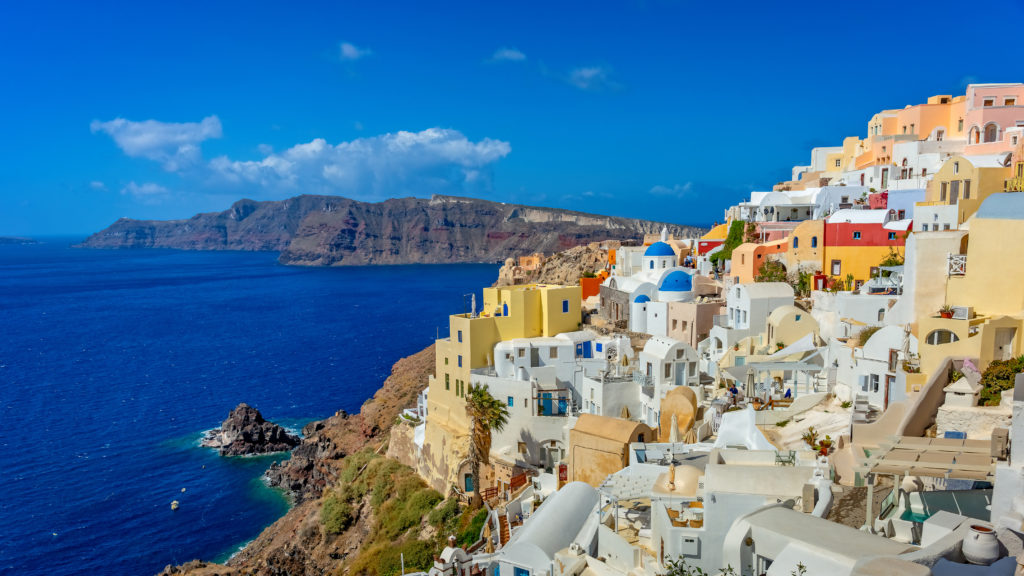
Santorini’s iconic white buildings lie on the steep cliffside overlooking the royal blue sea. Oia is known for its sunsets.
There are plenty of hotels in Greece, from large scale resorts to tiny pensions. There’s also a wide array of styles and stars. With Hyatt’s recent merger with Small Luxury Hotels, and the expanding portfolio in Greece, the boutique luxury segment is wide open. Small Luxury Hotels in Greece number 12 – six of which are on Mykonos and Santorini. The remaining six are scattered around the country, with one in Kanali, two in Athens, and one each in Thessaloniki, Ios, and Crete. All of these are available to book on Hyatt points.
Marriott Rewards members have plenty of options too. There are seven Marriott-Starwood properties in Athens alone, out of 22 properties in Greece. Two Luxury Collection hotels, Mystique and Vedema, both on Santorini, are also Virtuoso properties.

My Big Fat Greek Adventure
Mamma Mia! For centuries, Greece has beckoned to travelers, tantalizing us with ancient ruins, delicious food, incredible landscapes, and a rich heritage. The culture is inviting and fun. I haven’t met a Greek who didn’t love Greece. And with easy access from the US plus a plethora of new and exotic luxury properties, Greece has it all (and we want it).
The responses below are not provided or commissioned by the bank advertiser. Responses have not been reviewed, approved or otherwise endorsed by the bank advertiser. It is not the bank advertiser's responsibility to ensure all posts and/or questions are answered.